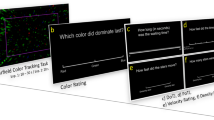Abstract
Time perception is defined as a subjective judgment on the elapsed time of an event. It can change according to both external and internal factors. There are two main paradigms of time perception; retrospective time perception (RTP) and prospective time perception (PTP). Two paradigms differ from each other according to whether the subject has knowledge on the importance of passage of time in the given task. Since RTP paradigm studies are harder to conduct, studies on RTP paradigm is far fewer than studies on PTP. Thus in the current study, both RTP and PTP paradigms are investigated. Also, time perception is discussed in relation to internal clock model and cognitive load. Emotional motion videos are used to create cognitive load and manipulate internal clock. Results showed the effect of emotion on time perception. Another major finding is that shorter videos are perceived longer whereas longer videos are perceived shorter as in accordance with Vierordt’s Law. However, there was no difference between RTP and PTP paradigms. These results indicate that emotional videos change our internal clock while a number of changes in a motion video create cognitive load causing disturbance of time perception.





Similar content being viewed by others
References
Angrili A, Cherubini P, Pavese A, Manferidni S (1997) The influence of affective factors on time perception. Percept Psychophys 59:972–982
Arstila V (2012) Time slows down during accidents. Front Psychol 3:1–9
Block RA (1989) Experiencing and remembering time: affordances, context, and cognition. In: Levin I, Zakay D (eds) Time and human cognition: a life span perspective. Elsevier Science Publishers, Nort-Holland, pp 333–363
Block RA (2003) Psychological timing without a timer: the roles of attention and memory. In: Helfrich H (ed) Time and mind II: information processing perspectives. Hogrefe & Huber, Göttingen, pp 41–59
Block RA, Zakay D (1997) Prospective and retrospective duration judgments: a meta-analytic review. Psychonomic Bull Rev 4:184–197
Block RA, Hancock PA, Zakay D (2010) How cognitive load affects duration judgments: a meta analytic review. Acta Physiol (Oxf) 134:330–343
Buhusi CV, Meck WH (2006) Interval timing with gaps and distracters: evaluation of the ambiguity, switch, and time-sharing hypothesis. J Exp Psychol Anim Behav Process 32:329–338
Droit-Volet S, Meck WH (2007) How emotions colour our perception of time. Trends Cogn Sci 12:504–513
Friedman WJ, Wilkins AJ (1985) Scale effects in memory for the time events. Mem Cogn 13:168–175
Gibbon J (1977) Scalar expectancy theory and Weber’s law in animal timing. Psychol Rev 3:279–325
Hintzman DL (2001) Judgements of frequency and recency: how they relate to reports of subjective awareness. J Exp Psychol Learn Mem Cogn 27:1347–1358
Lejeune H, Wearden JH (2009) Vierordt’s the experimental study of the time sense (1868) and its legacy. Eur J Cogn Psychol 21(6):941–960
Loftus EF, Schooler JW, Boone SM, Kline D (1987) Time went by so slowly: overestimation of event duration by males and females. Appl Cognit Psychol 1:3–13
Meck WH (1996) Neuropharmacology of timing and time perception. Cogn Brain Res 3(3–4):227–242
Mereu S, Lleras A (2013) Feelings of control restore distorted time perception of emotionally charged events. Conscious Cogn 22(1):306–314
Noulhiane M, Mella N, Samson S, Ragot R, Pouthas V (2007) How emotional auditory stimuli modulate time perception. Emotion 7(4):697–704
Ornstein RE (1969) On the experience of time. Penguin, Harmandsworth
Owen AM, McMillan KM, Laird AR, Bullmore E (2005) N-back working memory paradigm: a meta-analysis of normative functional neuroimaging studies. Hum Brain Mapp 25:46–59
Schöger E (1993) Event-related potentials to auditory stimuli following transient shifts of spatial attention in a Go/Nogo task. Biol Psychol 36(3):183–207
Sutherland MR, Mather M (2012) Negative arousal amplifies the effects of saliency in short-term memory. Emotion 12(6):1367–1372
Tamm M, Uusberg A, Allik J, Kreegipuu K (2014) Emotional modulation of attention affects time perception: evidence from even-related potentials. Acta Physiol (Oxf) 149:148–156
Treisman M (1963) Temporal discrimination and the indifference interval: implications for a model of the “internal clock”. Psychol Monogr Gen Appl 576:1–31
Wagatsuma H, Yamaguchi Y (2007) Neural dynamics of the cognitive map in the hippocampus. Cogn Neurodyn 1:119–141
Wearden JH (2015) Passage of time judgements. Conscious Cogn 38:165–171
Yamada Y, Kawabe T (2011) Emotion colours time perception unconsciously. Conscious Cogn 20(4):1835–1841
Acknowledgements
All videos in the study were used in accordance with the law of copyright in Turkey. This work was supported by Research Fund of Istanbul University. Project-No:51581.
Author information
Authors and Affiliations
Corresponding author
Ethics declarations
Conflict of interest
The authors declare that they have no conflict of interest.
Rights and permissions
About this article
Cite this article
Özgör, C., Şenyer Özgör, S., Duru, A.D. et al. How visual stimulus effects the time perception? The evidence from time perception of emotional videos. Cogn Neurodyn 12, 357–363 (2018). https://doi.org/10.1007/s11571-018-9480-6
Received:
Revised:
Accepted:
Published:
Issue Date:
DOI: https://doi.org/10.1007/s11571-018-9480-6




